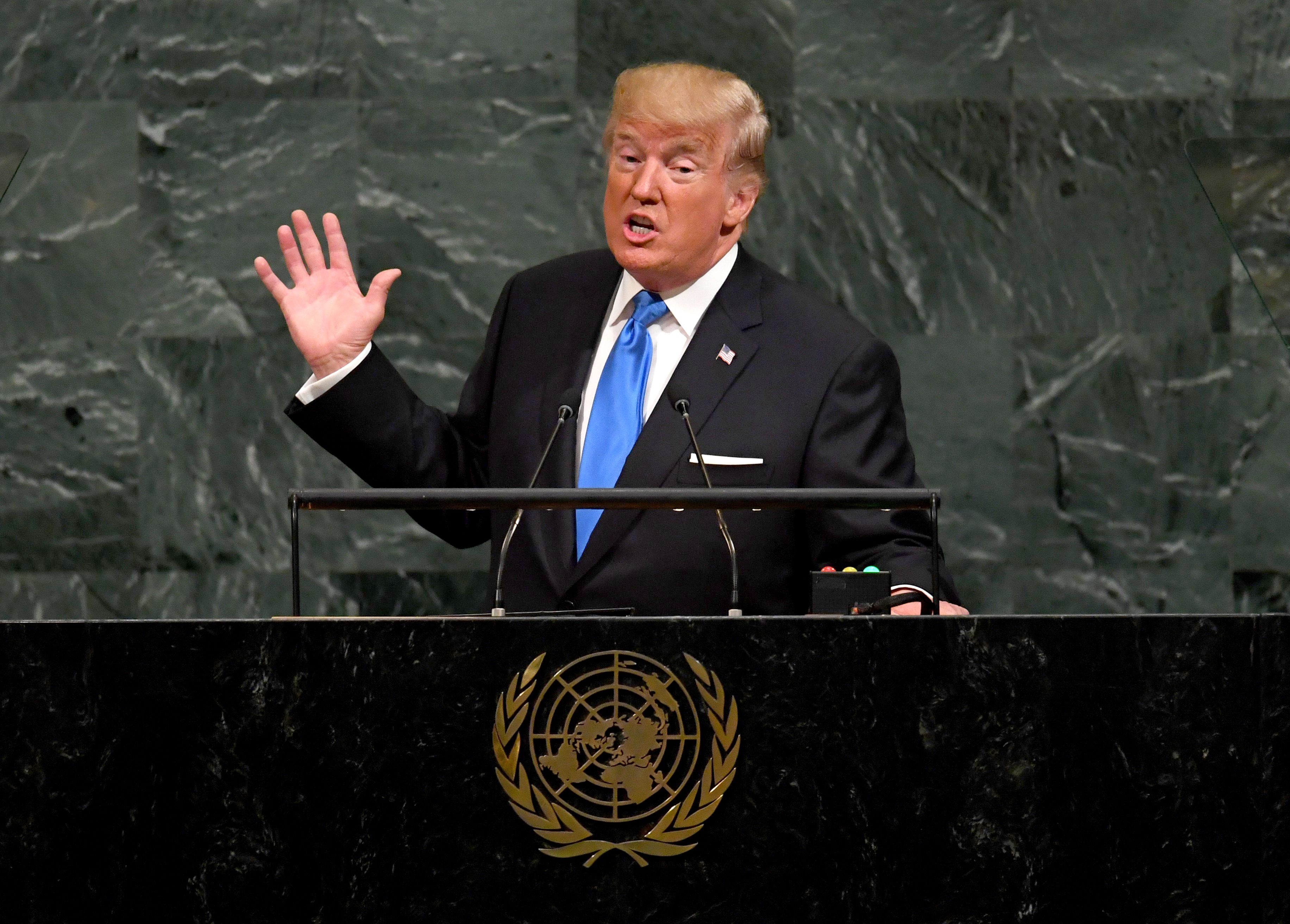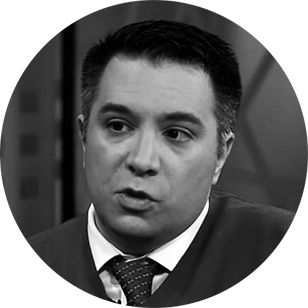What would provoke Trump to 'totally destroy' North Korea?
On the president's fuzzy warning to the 'Rocket Man'


A free daily email with the biggest news stories of the day – and the best features from TheWeek.com
You are now subscribed
Your newsletter sign-up was successful
At the United Nations General Assembly on Tuesday, President Trump did his best to sketch out a real foreign policy vision for his administration. And while many will claim they don't understand it, don't like it, or don't want it, the Trump Doctrine is clear and has been all along. Trump is embracing his own form of realism — it's just mixed with a splash of moralism and topped with a reality TV twist.
But when it comes to the details, like say, what to do about the world's biggest national security challenge — North Korea — his positions are much fuzzier.
It was clear, at least, that President Trump again put Kim Jong Un, whom he called "Rocket Man," on notice on Tuesday. If America or its allies are forced to defend itself from an attack by Kim, "we will have no choice but to totally destroy North Korea," Trump said. This quote lit up social media, and for good reason.
The Week
Escape your echo chamber. Get the facts behind the news, plus analysis from multiple perspectives.

Sign up for The Week's Free Newsletters
From our morning news briefing to a weekly Good News Newsletter, get the best of The Week delivered directly to your inbox.
From our morning news briefing to a weekly Good News Newsletter, get the best of The Week delivered directly to your inbox.
The word "destroy" is likely to make foreign policy experts here in Washington twist in their cushy chairs. Did Trump mean he would nuke North Korea — the only way to destroy a nation of 25 million people — if Kim even attacked with conventional weapons? What does the word "destroy" actually mean? Is he really serious?
Unfortunately, we can only speculate about the answers.
You see, the U.S. president, if you haven't noticed, loves to exaggerate just a wee bit. He also does not understand the precise language of foreign policy or national security. He does not have a master's degree from Yale in international affairs. His remarks come from the gut — even his prepared ones, it seems.
America's established policy is that if North Korea launched the scariest of all attacks — a nuclear strike, likely what Trump was referring to — on the U.S. or its allies in the region, America would launch a devastating nuclear counterattack on Pyongyang. While we don't know how far Washington would go, you can bet President Trump would at least match North Korea nuke for nuke. Trump would also probably utilize the full resources of the U.S. military, including its nukes, to destroy Kim's ability to attack again with nuclear weapons. Essentially, a Second Korean War would begin — the only question is how many atomic bombs would be dropped. And considering the size of North Korea, it would only take a few nuclear weapons for that nation to be truly wiped off the map.
A free daily email with the biggest news stories of the day – and the best features from TheWeek.com
That all seems clear, if terrifying.
Where things get a little murky is if North Korea were to launch a conventional attack on the U.S. or its allies. For example, say Pyongyang struck islands with artillery fire along the border between North and South Korea — like they have done in the past — what would Washington and its allies do?
I would argue Team Trump, along with South Korea, would likely take out the offending weapons platforms that launched the attacks and potentially escalate things a notch. Allied forces, for example, could decide to use this opportunity to destroy all of the 11,000 or so artillery tubes pointed like a loaded gun at Seoul and their accompanying missile batteries. This would not exactly "totally destroy North Korea," but it would exact a heavy price on them for their actions — something that has not happened recently when they have lashed out by sinking South Korean naval vessels or shelling South Korean islands.
There is, however, a clear danger here. Having to "explain" Trumpisms is itself a challenge. Other nations, especially North Korea, might take such threats at face value. They might think Washington's bluster is actual policy. In fact, Pyongyang has already declared it will speed up its nuclear weapons and missile research in response to recent sanctions and allied actions. I would not be shocked if Kim Jong Un in the coming days decides to live up to his new nickname and tests another ICBM, this time splashing one down a few hundred miles off the U.S. West Coast.
Tuesday seems to be the day President Trump declared his own "red line" when it comes to North Korea. Let's just hope Pyongyang does not cross it — and our own president refines his own terminology. Otherwise, we could be in for a world of trouble.
Harry J. Kazianis is director of defense studies at the Center for the National Interest, founded by former U.S. President Richard M. Nixon.
-
 How the FCC’s ‘equal time’ rule works
How the FCC’s ‘equal time’ rule worksIn the Spotlight The law is at the heart of the Colbert-CBS conflict
-
 What is the endgame in the DHS shutdown?
What is the endgame in the DHS shutdown?Today’s Big Question Democrats want to rein in ICE’s immigration crackdown
-
 ‘Poor time management isn’t just an inconvenience’
‘Poor time management isn’t just an inconvenience’Instant Opinion Opinion, comment and editorials of the day
-
 Epstein files topple law CEO, roil UK government
Epstein files topple law CEO, roil UK governmentSpeed Read Peter Mandelson, Britain’s former ambassador to the US, is caught up in the scandal
-
 Iran and US prepare to meet after skirmishes
Iran and US prepare to meet after skirmishesSpeed Read The incident comes amid heightened tensions in the Middle East
-
 Israel retrieves final hostage’s body from Gaza
Israel retrieves final hostage’s body from GazaSpeed Read The 24-year-old police officer was killed during the initial Hamas attack
-
 China’s Xi targets top general in growing purge
China’s Xi targets top general in growing purgeSpeed Read Zhang Youxia is being investigated over ‘grave violations’ of the law
-
 Panama and Canada are negotiating over a crucial copper mine
Panama and Canada are negotiating over a crucial copper mineIn the Spotlight Panama is set to make a final decision on the mine this summer
-
 Why Greenland’s natural resources are nearly impossible to mine
Why Greenland’s natural resources are nearly impossible to mineThe Explainer The country’s natural landscape makes the task extremely difficult
-
 Iran cuts internet as protests escalate
Iran cuts internet as protests escalateSpeed Reada Government buildings across the country have been set on fire
-
 US nabs ‘shadow’ tanker claimed by Russia
US nabs ‘shadow’ tanker claimed by RussiaSpeed Read The ship was one of two vessels seized by the US military
